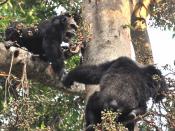The animal behavioral analyzation which focuses its application upon non-human primates; primatology, has presented us with numerous substantial insights into our retained human nature. Through field research, biological studies, and observations of various species of primates, analyzed data has contributed to our knowledge, that, indeed, non-human primates' demeanor keys us in to our own behaviors and actions.
Famous primatologist, Jane Goodall's research of chimps in their natural habitat of Tanzania has provided the anthropological field to broader and flourish. Her intense and dedicated research of chimpanzees exhibited that chimps have an ability to socialize. The contact or caress of another chimp provides an emotional reaction to occur, resulting in a society of socially-able beings. The presence of social ingenuity among chimpanzees also allows for social units, which contain the dominating male or female, often strong and intelligent, descending to the elderly or infant chimps, whom are very dependent.
The formation of social units allows for mobility to occur and for chimpanzees to ascend into more dominant roles in their community, as well as descend from significant roles.
Humans have developed this same characteristic in society. Social ability and social status are key elements to our survival in our civilization today. The capability to interact with others socially is a key insight observed.
The usage and production of tools is among one of the most important types of Chimp characteristics which provides insight to our own race.
Chimps utilize hard objects, such as rocks or tree stumps to break open nuts and other solid material. Their use of sticks to capture insects and retrieve shrubbery also provides easy access to their vital nutrition. Their tool fabrication also provides us with the level of intelligence chin these chimps possess. Making and using these tools present us with insight to...


